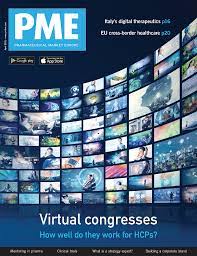Italy accelerates the path towards digital therapeutics implementation

Rome: Following the USA, Germany and France as pioneers in digital therapeutics adoption, Italy is taking action to reinforce the implementation of digital therapeutics nationwide.
In January 2021, Tendenze Nuove, the official Smith Kline Foundation journal, announced the publication of ‘Digital Therapeutics, an Opportunity for Italy’, a white paper whose recommendations lay the foundational knowledge for Italian digital therapeutics ecosystem advancement and demonstrate Italy’s commitment to introducing the new class of digital therapeutics into medical practice.
Previously depicted as the distant future, the era of digital therapeutics is already here. 2020 was a game changer for digital therapeutics and digital health in general, as the emergence of COVID-19 caused a qualitative shift in the scale of new technology adoption that resulted in the ongoing evolution of healthcare towards digital, personalised and accessible treatment.
Concurrently, the pandemic sparked the willingness and readiness of all stakeholders – healthcare professionals, patients and regulators – to reinforce the implementation of digital tools.
On a global scale, examples of this occurring include the video game Endeavor in the USA, which in June 2020 became the first app to receive FDA approval for the treatment of ADHD in children. 2020 was also the year digital health apps first became officially available for statutory reimbursement under the Digital Healthcare Act (DVG) in Germany.
Roberto Ascione, CEO of Healthware Group, said: “The current global scenario is very diverse with respect to the ability of individual countries and their healthcare systems to adopt and regulate these new therapeutic treatments that will mark the future of medicine, with a crucial impact on patients in terms of access to treatment and the sustainability of healthcare systems.
“In Italy, the collaboration between innovators and the different players of the national health system is essential to gain more awareness and facilitate the adoption of this new generation of therapies, as has already been done in other countries.”
The runway of any innovation is rarely straightforward, and the factors hindering the introduction and adoption of digital therapies to prevent, manage or treat a broad spectrum of physical, mental and behavioural conditions in medical practice are still numerous.
Apart from obvious impediments like time constraints, lack of training, social and cultural norms, and limited overall digital maturity in the health sector, there are multiple regulatory issues that remain partially or even completely unresolved.
Given the acceleration of telehealth, the adoption of remote and other digital health tools as a result of the pandemic, as well as the increasing investment opportunities pouring in to the digital therapeutics space, a comprehensive plan involving all Italian ecosystem stakeholders is required for digital therapeutics to overcome the above queries and other related barriers.
Such a plan has already been developed in Italy, and as of early 2021, it is levelling up the score with other countries in the digital therapeutics realm. The white paper ‘Digital Therapeutics, an Opportunity for Italy’ published on 13 January 2021 in Tendenze Nuove, the official journal of Smith Kline Foundation, contains recommendations for the Italian ecosystem to advance in DTx.
Co-promoted by daVinci Digital Therapeutics, FADOI, FSK (Smith Kline Foundation) and Healthware Group, the publication is the outcome of ongoing collaborative efforts by over 40 of Italy’s leading experts in the field.
Launched in 2019 at the Italian Digital Health Therapeutics Day event, the initiative included renowned public and private industry professionals from medicine, health and civil society sectors who formed a working group within the frame of the Smith Kline Foundation project ‘Digital Therapies for Italy – #DTxITA’. Cooperation such as that of this group represents an invaluable contribution to the creation of an innovative and sustainable healthcare ecosystem in the country.
Gualberto Gussoni, Scientific Director of FADOI, Scientific Society of Internal Medicine, project leader and editor of the white paper explained: “The project aims to identify and define the conditions necessary to allow patients to access the benefits of digital therapeutics, and for Italy to become a reference point for their research and development, thus making a useful contribution to the country from a social, health and economic point of view.
“The number of experts involved in the project has gradually increased from 21 to more than 40 in order to acquire the necessary technical, clinical, methodological, regulatory, organisational and economic skills that would allow the various aspects of research, access and commercialisation of digital therapies to be investigated in the most appropriate manner. These experts come from prestigious Italian universities, the clinical and research worlds, the regulatory, legal and industrial spheres and from leading patient organisations.”
The project also shows Italy’s commitment to fostering cooperation among all stakeholders of the health ecosystem, which is crucial for the future of digital therapeutics. Constant work at every level is required to enable all healthcare professionals and patients to have access to the right tools and necessary skills, as well as instill the necessary mindset changes.
Among the first to act were the University of Rome Unitelma Sapienza, which has already begun designing university training courses for expert patients, general practitioners and other categories of HCPs, and the University of Verona which, together with daVinci Digital Therapeutics, has launched a collaborative project for the research and clinical development of digital therapies for the treatment of obesity.
Giuseppe Recchia, Director of Tendenze Nuove and promoter of the project by the Smith Kline Foundation said: “The publication of this white paper and its recommendations on digital therapeutics represents a significant contribution at the international level. In fact, it is the first occasion where digital therapeutics, a new class of medical interventions, have been submitted to the evaluation of experts from medicine, health and civil society with the aim of governing their introduction into general medical practice in the country.”
The publication of ‘Digital Therapeutics, an Opportunity for Italy’ can definitely be considered a solid foundation for creating a viable digital therapeutics environment in Italy, and in this way, it presents a clear opportunity for Italy to catch up with the leading countries in the very near future.
The ultimate goal of this digital therapeutics journey is to provide patients and physicians alike with safe and trusted access to a new class of therapies characterised by more active patient involvement, such as those aimed at chronic diseases associated with dysfunctional lifestyles and behaviours in which the participatory role of the patient in the care pathway can be particularly relevant, as well as to create a favourable regulatory environment.
Nevertheless, it is important to understand that the publication of the white paper does not represent the conclusion of this project, but rather, embodies the beginning of the path towards advancement of digital therapeutics.
It contains a clear call to action addressed to all stakeholders of the Italian healthcare system: doctors, pharmacists and other health professionals, patient and citizen organisations, pharmaceutical, technological and insurance companies, and regulatory institutions, and that is to unite and work together every single day to reach the set objective of accessible, innovative, digitally advanced and efficient healthcare in Italy.





